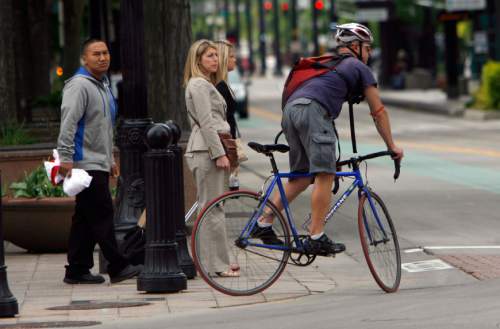This is an archived article that was published on sltrib.com in 2015, and information in the article may be outdated. It is provided only for personal research purposes and may not be reprinted.
The time may come when Salt Lake County employees can get a monthly $25 incentive for riding bikes to work.
But not just yet.
On Tuesday, the County Council voted 5-4, along political party lines, not to go along with a proposal by the administration of Democratic Mayor Ben McAdams to become the first local government in Utah to provide the benefit as a means of promoting healthy lifestyles and air quality.
While the idea sparked a couple of concerns, the primary objection of the five Republican council members centered around the proposal's timing. They maintained the proposal should be considered months from now, as part of an overall employee-compensation package in the 2016 budget, rather than having it pop up five months into the county's fiscal year.
"The timing's wrong," said Council Chairman Richard Snelgrove. "I'd like to see it addressed more holistically. It's not because I don't support your effort. But I think it's flawed."
Added Councilman Steve DeBry: "Let's let it simmer and digest for a few months."
Megan Hillyard, the county's associate director of administrative services, said she made the proposal now because May is "Bike Month," ushering in a season when more employees are likely to take advantage of the offer.
The county's Bicycle Advisory Committee recommended the incentive, Hillyard added, noting that the IRS recently deemed the cycling reward a "permissible transportation benefit" along with discounted mass-transit passes and credits for riding in a van pool.
She said she didn't expect enough county employees to take part to make a dent in the county's $1 billion-a-year budget, projecting costs at $12,000 to $30,000 at most.
"With the [riding] season before us, now is the timely time" to move forward, said Democratic Councilwoman Jenny Wilson.
"Because it doesn't require a budget adjustment," added party colleague, Arlyn Bradshaw, "there's no need to wait."
Council Republicans didn't see it like that.
DeBry questioned how participation would be verified and wondered whether the benefit would be extended next to people who jogged to work or rode skateboards. And what if these employees got into an accident on the way to or from work? Would the county be liable?
Hillyard responded that the honor code would apply, although a participating employee's supervisor would have to sign off every quarter and submit the form to human resources.
And, based on the district attorney's advice, a disclaimer would spare the county legal responsibility.
Those answers didn't faze Snelgrove.
"I'm concerned with an increase in subsidizing peoples' commutes to work and the cost to taxpayers. Subsidizing commutes? What's next? A subsidy to walkers, joggers?" he said. "It singles out a special class of county employee and doesn't pass the fairness test."
"It's a great initiative," added GOP Councilwoman Aimee Winder Newton. "But it should be measured up with other benefits."



